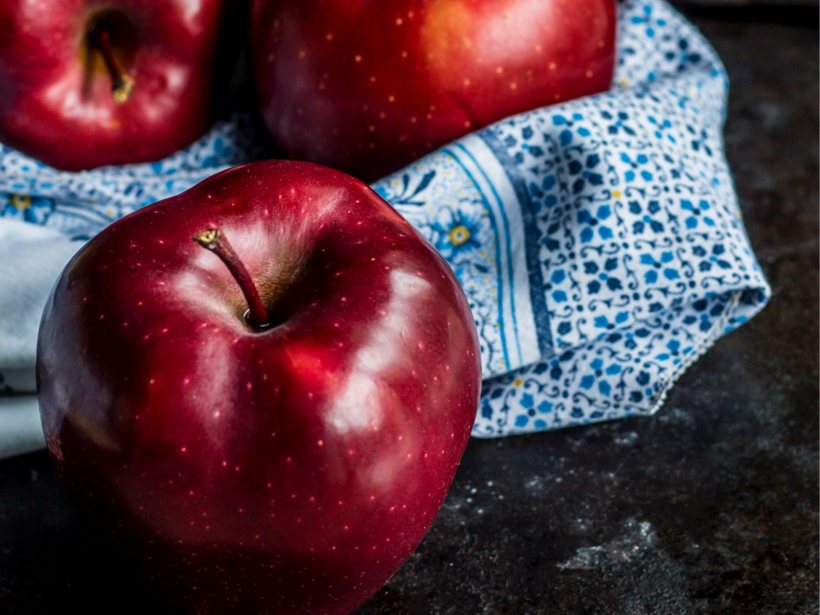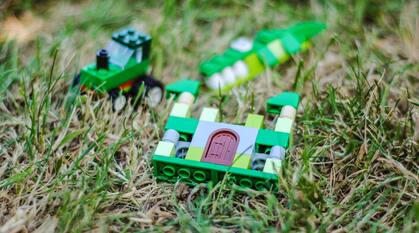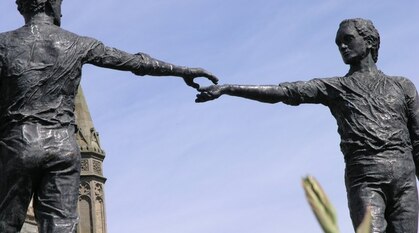6 things you never knew were invented by Quakers
From anti-capitalist boardgames to star-spangled banners to one very controversial line, Jon Martin takes a look back at some of his favourite Quaker innovations through history for #QuakerFacts.

Throughout history Quakers have been open to practical experimentation as well as spiritual, and have had a hand in a number of inventions of note. Here is a list of my personal favourites.
1. Chocolate bars
The Maya invented drinking chocolate around 400 AD. Centuries later, during the 'invention' of modern day chocolate, Quakers were leading lights. While most chocolate manufacturers have their own folk stories, there is no doubting that the early Quaker chocolatiers were keen inventors with a lasting influence.
Joseph Storrs Fry invented the first chocolate bar in 1847, and chocolatier John Cadbury's business, Cadbury, is now a world famous brand with hundreds of chocolicious inventions to its name – many invented while it was still owned by Quakers (more on that Quaker chocolate history here). And Quaker contributions to the world of sweet treats weren't limited to chocolate – Fruit Pastilles were invented by Quaker confectioner Joseph Rowntree in 1881.
2. The American flag
A question for you: did the Quaker upholsterer Betsy Ross invent the American flag? That depends on whether you prefer myth-making to history…
Taught to sew by her Quaker family, Betsy became an upholstery apprentice. She fell in love with another apprentice, was kicked out of the Quakers for eloping with him, and then started her own upholstery business with her husband John. They attended Christ Church in Gloucester City, New Jersey, which also counted George Washington among its congregation.
Betsy's upholstery business also produced flags. According to legend, during this time Betsy, in the company of a small group of rebels including Washington, drafted the 'Betsy Ross flag' – a forerunner of today's American flag.
When she died, Betsy Ross was buried in a Free Quakers burial ground. Free Quakers were those kicked out for failing to adhere to the Quaker peace testimony during the American Revolutionary War – but that is story for another time.
3. The Mason-Dixon Line
While the Betsy Ross flag story isn't favoured by many scholars today, the next Quaker innovation is a firm historical fact – though it had some pretty questionable consequences. It was the work of a Quaker named Jeremiah Dixon, a British 18th century surveyor and astronomer.
Dixon had a curious career. Alongside fellow surveyor Charles Mason he attempted to observe the transit of Venus from Sumatra but ended up observing it at the Cape of Good Hope. Then, from 1763 to 1767, he and Mason went to North America and drew the now infamous Mason-Dixon Line across the nation.
At the time, Dixon's work helped settle a border dispute between Maryland, Pennsylvania, and Delaware. However, it came to be widely seen as representing the border between the Northern United States and the Southern United States. In the years preceding the American Civil War, the Mason-Dixon Line marked the northern limit of slavery in the United States.
In his time Dixon was honoured as a Fellow of the Royal Society. He died young in 1779, surveying castles in County Durham, and would have no way of knowing the significance his line would have in coming centuries. He did, however, gain notoriety in Quaker circles due to his tendency to wear a long red coat and drink excessively – outrageous stuff for 18th century Quakers!
4. Red Delicious apples
Did you know that 'America's favourite apple' is a Quaker apple?
The year is 1856, and devoted Quaker Jesse Hiatt has moved from Indiana to Iowa. Near the town of Peru, Madison County, he plants an apple orchard. Between two trees a sapling springs up. Jesse chops it down.
Now, apple seeds bear no resemblance to the parents. Each sapling is a roll of the genetic dice, with most of the results tasting disgusting. However, every now and then a miracle happens – and strange things were at work in Iowa.
To Jesse's surprise, the sapling sprouted again next year. He chopped it down once more – only to find it grew back a third time. Perhaps his Quaker instincts kicked in as he let nature do its thing, saying: "If thee must grow, thee may." He wouldn't regret his choice. When the sapling fruited it produced the best apple he had ever tasted.
After the variety won a national prize in 1893, Stark Nurseries bought it and renamed it Stark Delicious, later changing it to Red Delicious (Jesse had originally named it Hawkeye – a fun fact for Marvel fans!). The apple became wildly popular, and is valued today for its unusual 'coke bottle' base, which makes it easy for suppliers to crate and stack.
Meanwhile in Iowa that first sapling took on a sacred status, protected by fences and the subject of much media and horticultural interest. Jesse's apple tree was an attraction for years, but it met a dramatic end, blown down by the Armistice Day Blizzard of 1940.
Many mutations later, the Red Delicious in the shops today is a far cry from Jesse's original miracle apple. On the upside, it still accounts for half of America's apple exports, though I'm more of a Pink Lady man myself.
5. Sanitary towels
This tale begins in Birmingham, England, with Quaker brothers Thomas and William Southall. In 1820 they established a firm of manufacturing chemists that eventually came to be known as Southalls (Birmingham) Ltd. In 1888 Southalls brought out pads for 'Ladies Travelling by Land and Sea' – possibly the first ever commercial sanitary towels.
Another claimant to that title is US pharmaceutical giant Johnson & Johnson who brought Lister's Towels to market around the same time. Even this invention has a Quaker connection, if you dig deeper into the towel's namesake, Joseph Lister.
Lister transformed surgical practice thanks to his pioneering use of antiseptics, and was also (you guessed it) a Quaker. Lister's father was an amateur scientist and wine merchant and gave Lister a solid Quaker education packed with scientific enthusiasm. Lister went on to join the Scottish Episcopal Church, but we'll still count him!
In case you're wondering: yes, Listerine is also named in honour of Lister. The neat ending to the tale is that like the towels, Listerine is now also owned by Johnson & Johnson. The Southalls factory in Birmingham, however, closed down in 2007.
6. Monopoly
Finally, did you know that monopoly was created to expose the evils of free market capitalism? You did? Well, did you know it was Quakers who can take a lot of the credit for it?
Lizzie Magie invented The Landlord's Game in 1903 to illustrate how rental markets enriched landlords while impoverishing tenants. Lizzie was a Georgist, which in the simplest terms means she thought land belonged equally to all. Lizzie was also connected to Quakers, who throughout the US played a key role in spreading it and tweaking the rules – furthering its development.
Most Quakers I know love both a good board game and progressive politics so it's no surprise that Monopoly's anti-capitalist roots have Quaker ties. The game eventually found its way to businessman Charles Darrow who, spotting an opportunity, sold it to Parker Brothers. Darrow received the royalties and Parker Brothers turned it into a massive global brand, further tweaking the rules and more importantly losing the political message Lizzie was trying to spread.
So, next time you play Monopoly, think of Lizzie as the game grinds on and on, causing misery and discord among everyone who isn't winning. Remind you of anything?
So that's my list, we spent a lot of time jumping across the North Atlantic but that's very much in the spirit of most of Quaker history! What's your favourite Quaker invention? Suggestions welcome – send them to socialmedia@quaker.org.uk (please include a source). Corrections are also welcome, researching this was great fun but even in the internet age obscure history can be murky…


